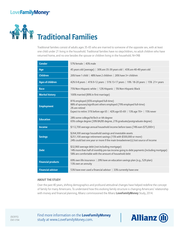Description
True to our promises …
so you can be true to yours.
®
As leading providers of annuities and life insurance, Allianz Life Insurance Company
of North America (Allianz) and its subsidiary, Allianz Life Insurance Company of
New York (Allianz Life® of NY), base each decision on a philosophy of being true:
True to our strength as an important part of a leading global financial organization.
True to our passion for making wise investment decisions. And true to the people
we serve, each and every day.
Through a line of innovative products and a network of trusted financial
professionals, Allianz and Allianz Life of NY together help people as they seek to
achieve their financial and retirement goals. Founded in 1896, Allianz, together with
Allianz Life of NY, is proud to play a vital role in the success of our global parent,
Allianz SE, one of the world’s largest financial services companies.
While we pride ourselves on our financial strength, we’re made of much more than
our balance sheet. We believe in making a difference with our clients by being true
to our commitments and keeping our promises.
People rely on Allianz and Allianz Life of NY today and count on us for tomorrow – when they need us most. All contract and rider guarantees, including optional benefits and any fixed subaccount crediting rates or annuity payout rates, are backed by the claims-paying ability of the issuing company. They are not backed by the broker/dealer from which this annuity is purchased, by the insurance agency from which this annuity is purchased, or any affiliates of those entities and none makes any representations or guarantees regarding the claims-paying ability of Allianz Life Insurance Company of North America or Allianz Life Insurance Company of New York. • Not FDIC insured • May lose value • No bank or credit union guarantee • Not a deposit • Not insured by any federal government agency or NCUA/NCUSIF Products are issued by Allianz Life Insurance Company of North America, 5701 Golden Hills Drive, Minneapolis, MN 55416-1297. www.allianzlife.com. In New York, products are issued by Allianz Life Insurance Company of New York, One Chase Manhattan Plaza, 38th Floor, New York, NY 10005-1423. www.allianzlife.com/new-york.
Variable products are distributed by their affiliate, Allianz Life Financial Services, LLC, member FINRA , 5701 Golden Hills Drive, Minneapolis, MN 55416-1297. www.allianzlife.com. Only Allianz Life Insurance Company of New York is authorized to offer annuities and life insurance in the state of New York. Product and feature availability may vary by state and broker/dealer. Follow Allianz Life Insurance Company of North America at: AllianzLife @AllianzLife AllianzUS Allianz-Life +AllianzLife Page 12 of 12 (R-11/2014) .
People rely on Allianz and Allianz Life of NY today and count on us for tomorrow – when they need us most. All contract and rider guarantees, including optional benefits and any fixed subaccount crediting rates or annuity payout rates, are backed by the claims-paying ability of the issuing company. They are not backed by the broker/dealer from which this annuity is purchased, by the insurance agency from which this annuity is purchased, or any affiliates of those entities and none makes any representations or guarantees regarding the claims-paying ability of Allianz Life Insurance Company of North America or Allianz Life Insurance Company of New York. • Not FDIC insured • May lose value • No bank or credit union guarantee • Not a deposit • Not insured by any federal government agency or NCUA/NCUSIF Products are issued by Allianz Life Insurance Company of North America, 5701 Golden Hills Drive, Minneapolis, MN 55416-1297. www.allianzlife.com. In New York, products are issued by Allianz Life Insurance Company of New York, One Chase Manhattan Plaza, 38th Floor, New York, NY 10005-1423. www.allianzlife.com/new-york.
Variable products are distributed by their affiliate, Allianz Life Financial Services, LLC, member FINRA , 5701 Golden Hills Drive, Minneapolis, MN 55416-1297. www.allianzlife.com. Only Allianz Life Insurance Company of New York is authorized to offer annuities and life insurance in the state of New York. Product and feature availability may vary by state and broker/dealer. Follow Allianz Life Insurance Company of North America at: AllianzLife @AllianzLife AllianzUS Allianz-Life +AllianzLife Page 12 of 12 (R-11/2014) .













